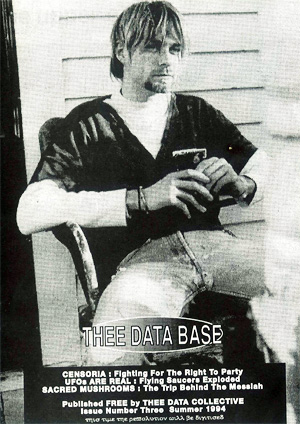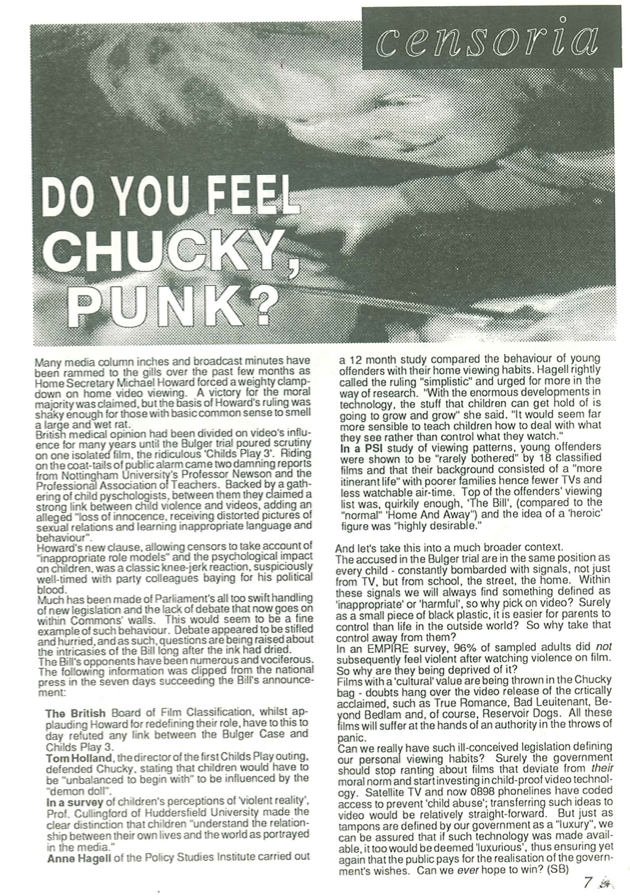
First published in Thee Data Base, July 1994
Many media column inches and broadcast minutes have been rammed to the gills over the past few months as Home Secretary Michael Howard forced a weighty clampdown on home video viewing. A victory for the moral majority was claimed, but the basis of Howard’s ruling was shaky enough for those with basic common sense to smell a large and wet rat.
British medical opinion had been divided on video’s influence for many years until the Bulger trial poured scrutiny on one isolated film, the ridiculous ‘Childs Play 3’. Riding on the coat-tails of public alarm came two damning reports from Nottingham University’s Professor Newson and the Professional Association of Teachers. Backed by a gathering of child pyschologists, between them they claimed a strong link between child violence and videos, adding an alleged “loss of innocence, receiving distorted pictures of sexual relations and learning inappropriate language and behaviour”.
Howard’s new clause, allowing censors to take account of “inappropriate role models” and the psychological impact on children, was a classic knee-jerk reaction, suspiciously well-timed with party colleagues baying for his political blood.
Much has been made of Parliament’s all too swift handling of new legislation and the lack of debate that now goes on within Commons’ walls. This would seem to be a fine example of such behaviour. Debate appeared to be stifled and hurried, and as such, questions are being raised about the intricasies of the Bill long after the ink had dried.
The Bill’s opponents have been numerous and vociferous. The following information was clipped from the national press in the seven days succeeding the Bill’s announcement:
The British Board of Film Classification, whilst applauding Howard for redefining their role, have to this to day refuted any link between the Bulger Case and Childs Play 3.
Tom Holland, the director of the first Childs Play outing, defended Chucky, stating that children would have to be “unbalanced to begin with” to be influenced by the “demon doll”.
In a survey of children’s perceptions of ‘violent reality’, Prof. Cullingford of Huddersfield University made the clear distinction that children “understand the relationship between their own lives and the world as portrayed in the media.”
Anne Hagell of the Policy Studies Institute carried out a 12 month study compared the behaviour of young offenders with their home viewing habits. Hagell rightly called the ruling “simplistic” and urged for more in the way of research. “With the enormous developments in technology, the stuff that children can get hold of is going to grow and grow” she said. “It would seem far more sensible to teach children how to deal with what they see rather than control what they watch.”
In a PSI study of viewing patterns, young offenders were shown to be “rarely bothered” by 18 classified films and that their background consisted of a “more itinerant life” with poorer families hence fewer TVs and less watchable air-time. Top of the offenders’ viewing list was, quirkily enough, ‘The Bill’, (compared to the “normal” ‘Home And Away”) and the idea of a ‘heroic’ figure was “highly desirable.”
And let’s take this into a much broader context.
The accused in the Bulger trial are in the same position as every child – constantly bombarded with signals, not just from TV, but from school, the street, the home. Within these signals we will always find something defined as ‘inappropriate’ or ‘harmful’, so why pick on video? Surely as a small piece of black plastic, it is easier for parents to control than life in the outside world? So why take that control away from them?
In an EMPIRE survey, 96% of sampled adults did not subsequently feel violent after watching violence on film. So why are they being deprived of it?
Films with a ‘cultural’ value are being thrown in the Chucky bag – doubts hang over the video release of the crtically acclaimed, such as True Romance, Bad Leuitenant, Beyond Bedlam and, of course, Reservoir Dogs. All these films will suffer at the hands of an authority in the throws of panic.
Can we really have such ill-conceived legislation defining our personal viewing habits? Surely the government should stop ranting about films that deviate from their moral norm and start investing in child-proof video technology. Satellite TV and now 0898 phonelines have coded access to prevent ‘child abuse’; transferring such ideas to video would be relatively straight-forward. But just as tampons are defined by our government as a “luxury”, we can be assured that if such technology was made available, it too would be deemed ‘luxurious’, thus ensuring yet again that the public pays for the realisation of the government’s wishes. Can we ever hope to win?
